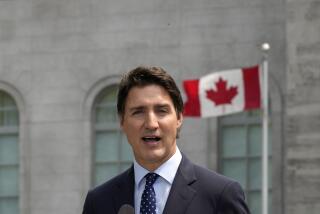Gorbachev Asks Canada to Help on Europe Plans
- Share via
OTTAWA — Soviet President Mikhail S. Gorbachev, arriving at the start of a weeklong visit to the United States and Canada, pressed Canada on Tuesday to consider Moscow’s proposals for a new European security system that will supplant both NATO and the Warsaw Pact and accommodate a reunified Germany.
Gorbachev, opening his talks with Prime Minister Brian Mulroney, sought Canadian understanding for Soviet opposition to the inclusion of a unified Germany in NATO’s military structure but stressed Moscow’s desire to develop a new security system that would bridge the old East-West divide in Europe, Soviet officials said.
Outlining proposals that he is expected to make later this week in discussions with President Bush in Washington, Gorbachev was described by informed Soviet sources as both adamant that Moscow could not accept German membership in the traditional North Atlantic Treaty Organization structure but flexible in stating Soviet willingness to develop a compromise.
Eduard A. Shevardnadze, the Soviet foreign minister, said after a separate meeting with Joe Clark, his Canadian counterpart, that German unification “will be both a useful and proper development in Europe, but a solution must be sought to its political-military status that meets the needs of the German nation, of Eastern and Central Europe and of the Soviet Union.”
For the Soviet Union, the future of Germany has become the primary international issue, senior Canadian officials said after the first round of talks, and it will clearly figure as one of the principal topics in Gorbachev’s meetings with Bush later this week.
Gorbachev and Shevardnadze will lay out the Soviet position in further talks here today, Soviet officials said, seeking Canadian support for proposals that they realize face considerable opposition within NATO and Mulroney’s influence with Bush to gain a fair consideration of Moscow’s concerns.
“Canada has more than a vote in NATO--it has a voice that is respected as independent, rational and sane,” a senior Soviet official in the Gorbachev party commented. “We believe that Canada, like the Soviet Union, is searching for a new security system for Europe, and we find that our ideas run rather close together.”
Shevardnadze, who talked at length with Clark about European security, accepted that NATO could be so fundamentally transformed from a military alliance to a political organization that German membership would be acceptable to the Soviet Union. But he stressed that Moscow would have to be convinced that the change was real and that NATO was no longer directed at it, Canadian officials said.
“The Soviet Union needs satisfaction on the issue of Germany in NATO,” a senior Canadian official said. “But Shevardnadze was not being categorical, and there were a lot of different ways, it was clear, that the Soviet Union could get the satisfaction and the assurances it needs.”
Shevardnadze, responding playfully to reporters’ questions, suggested that the Soviet Union might revive its old application to join NATO itself--an idea that has been considered seriously in Moscow and might be put forward to spur discussion on a successor security organization for both NATO and the Warsaw Pact.
Gorbachev, in an arrival statement at the Uplands air force base outside Ottawa, stressed Moscow’s desire for an expanded dialogue on mutual security as a result of the dramatic changes in Europe over the past year.
Recalling the Soviet Union’s alliance with Canada in World War II, he spoke of the need for a renewed partnership in shaping “the modern European home” in the post-Cold War era.
Although disparaged by the Canadian press as the “sleep-over summit” for its brevity--just 29 hours from landing to takeoff--the Gorbachev visit is intended to be “both informal and substantive,” Soviet officials said Tuesday.
“We no longer see the world in the old polarities or in simple superpower terms,” a member of Gorbachev’s delegation said. “Countries like Canada are very welcome partners for us, and we see them playing an increasingly important role in reshaping world politics.”
Canada is clearly flattered by the attention and arranged just the program that Gorbachev wanted for his short stay here--a welcome with more than enough pomp and color to fill a television screen, more ceremonies today that focus on Gorbachev as a leader who has won world respect for the Soviet Union and talks with one of the closest American allies to try out the latest Soviet ideas.
A battalion of the Royal Canadian Regiment, resplendent in scarlet tunics and white pith helmets, formed an honor guard to greet Gorbachev, a 21-gun salute boomed and schoolchildren cheered and mobbed him and his wife, Raisa, on their arrival. Thousands of people jammed into central Ottawa to catch a glimpse of the Soviet president as he called upon the Canadian governor general, Jeanne Sauve, the nation’s head of state, and had lunch at Mulroney’s official residence.
Later, the Gorbachevs strolled through an Ottawa shopping mall, drawing large and enthusiastic crowds.
More to Read
Sign up for Essential California
The most important California stories and recommendations in your inbox every morning.
You may occasionally receive promotional content from the Los Angeles Times.













